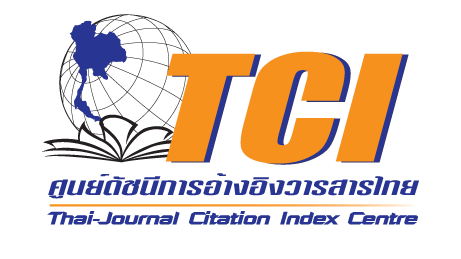การประพันธ์ทางเดี่ยวซออู้ เพลงเชิดนอก
คำสำคัญ:
การประพันธ์ทางเดี่ยว, เพลงเดี่ยว, เชิดนอก, ซออู้บทคัดย่อ
การประพันธ์ทางเดี่ยวซออู้ เพลงเชิดนอก มีแนวคิดการประพันธ์ทางเดี่ยวโดยใช้ทางปี่ในเป็นพื้นฐาน เนื่องจากที่ผ่านมายังไม่ปรากฏบทเพลงดังกล่าวสำหรับทางเดี่ยวซออู้ ผู้วิจัยได้ศึกษาโครงสร้าง คุณลักษณะของเพลงเชิดนอก จังหวะและเอกลักษณ์ของบทเพลง รวมถึงศึกษาหลักการประพันธ์เพลงไทย โดยเฉพาะอย่างยิ่งในการประพันธ์ทางเดี่ยว ในการศึกษาผู้วิจัยได้เลือกทางเดี่ยวปี่ใน เพลงเชิดนอก ของครูเทียบ คงลายทอง เป็นต้นแบบ จากการศึกษาพบว่าลักษณะของทางเดี่ยวปี่ใน เพลงเชิดนอก ประกอบด้วย ทำนองครวญ ทำนองเนื้อ ทำนองสร้อย ทำนองจับ มีการถ่ายทอดอารมณ์ให้ความรู้สึกถึงความรุกเร้า การไล่จับ ผู้วิจัยจึงนำรูปแบบดังกล่าวมาใช้ในการประพันธ์ เพื่อให้ได้ทางเดี่ยวซออู้ที่มีคุณลักษณะ รูปแบบและลีลาการบรรเลงใกล้เคียงกับทางปี่ใน ในการประพันธ์ทางเดี่ยวจึงประกอบไปด้วยโครงสร้างทำนองอย่างปี่ใน มีเทคนิค อาทิ ครั่น ขยี้ พรมนิ้ว รูดนิ้ว สะอึก สะเดาะคันชัก สะบัด นิ้วควง และใช้การตั้งสายซออู้เป็นคู่ 4 (เร-ซอล) ทำให้เกิดลีลาที่เป็นลักษณะเฉพาะของซออู้ ขยายขอบเขตการบรรเลงได้หลากหลายขึ้น ซึ่งจะก่อให้เกิดประโยชน์ต่อผู้เรียน สามารถนำมาใช้เป็นเพลงสำหรับการฝึกซ้อมพัฒนาทักษะฝีมือ และเป็นต้นแบบในการสร้างสรรค์เพลงเดี่ยวสำหรับซออู้ต่อไปได้
เอกสารอ้างอิง
Komkam, Pattara. "Choed Nok." Interview by Narisara Sakpunjachot. April 8, 2021.
Pherkhaw, Panisara. "Pii Nai solo in Choed Nok: Khru Peeb Konglaithong's style." Master's thesis, Chulalongkorn University, 2005. (in Thai)
Pidokrajt, Narongchai. Encyclopaedia of Thai Music. Nakhon Pathom: Mahidol University Press, 2014. (in Thai)

ดาวน์โหลด
เผยแพร่แล้ว
รูปแบบการอ้างอิง
ฉบับ
ประเภทบทความ
สัญญาอนุญาต
ลิขสิทธิ์ (c) 2023 วิทยาลัยดุริยางคศิลป์

อนุญาตภายใต้เงื่อนไข Creative Commons Attribution-NonCommercial-NoDerivatives 4.0 International License.
ลิขสิทธิ์ของบทความเป็นของเจ้าของบทความ บทความที่ได้รับการตีพิมพ์ถือเป็นทัศนะของผู้เขียน
กองบรรณาธิการไม่จำเป็นต้องเห็นด้วยและไม่รับผิดชอบต่อบทความนั้น





